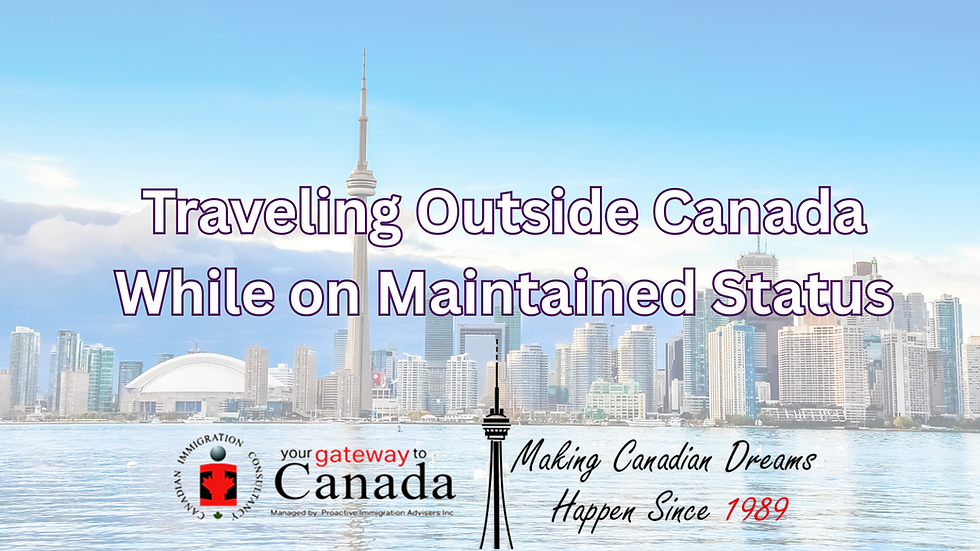Traveling Outside Canada While on Maintained Status
- Aug 11, 2025
- 2 min read

If you’re a foreign national in Canada—whether on a work permit or transitioning to a Post-Graduation Work Permit (PGWP)—your legal status is key to your ability to live, work, and stay in the country.
But what if your permit is about to expire, you’ve submitted your extension or PGWP application, and you decide to travel abroad before IRCC makes a decision?
Will you be able to return and keep working? Or could you lose your work rights at the border?
Let’s explore what Immigration and Refugee Protection Regulations (IRPR) Sections 186(u) and 186(w) mean for travel while on maintained status.
What Is “Maintained Status” in Canada?
Previously called implied status, maintained status allows you to legally remain in Canada under the same conditions of your current permit while IRCC processes your extension or new permit application—as long as you applied before your permit expired.
For example:
If you were authorized to work, you can keep working.
If you were authorized to study, you can keep studying.
However, these rights typically apply only while you remain in Canada.
IRPR 186(u) and 186(w) – The Key Rules
1. IRPR 186(u) – Extending a Work Permit
This provision allows you to keep working in Canada without a new work permit if:
You applied to extend your work permit before it expired, and
You stay in Canada while waiting for IRCC’s decision.
Travel Impact:If you leave Canada before your new permit is approved, your maintained work authorization ends. Even with a valid visa or eTA to re-enter, you’ll be admitted only as a visitor—meaning you cannot work until the new permit is issued.
2. IRPR 186(w) – Transitioning from Study to Work
This applies to certain graduates or foreign nationals who were already authorized to work and applied for a PGWP or work permit extension before their status expired.
Travel Impact:If you travel while your PGWP or extension is pending, you may return and continue working only if:
You still have a valid work permit, or
You have a work authorization letter from IRCC.
Without these, you may be allowed back into Canada only as a visitor, losing the right to work until IRCC approves your new permit.
Travel While on Maintained Status – At a Glance
Situation | While in Canada | If You Leave Before Approval |
Work Permit Extension (186(u)) | Can keep working | Lose work rights; re-enter as visitor |
PGWP Applicaiton (186(w)) | Can keep working | Need valid permit or IRCC letter |
Key Takeaways
Traveling before approval is risky if you need uninterrupted work rights.
Even PGWP applicants under 186(w) can lose work rights at the border without proper documentation.
Always carry proof of your application, a valid TRV or eTA (if required), and any IRCC authorization letters.
If possible, delay travel until IRCC issues your new permit.
Final Thoughts
Maintained status is a powerful protection for those extending or changing their temporary status—but it works best if you stay in Canada while waiting for IRCC’s decision.
If travel is unavoidable, make sure you understand IRPR 186(u) and 186(w), prepare your documents, and plan for the possibility that you might not be able to work immediately upon return.
For case-specific guidance, Gateway to Canada can help you understand the risks and navigate your options.








Comments